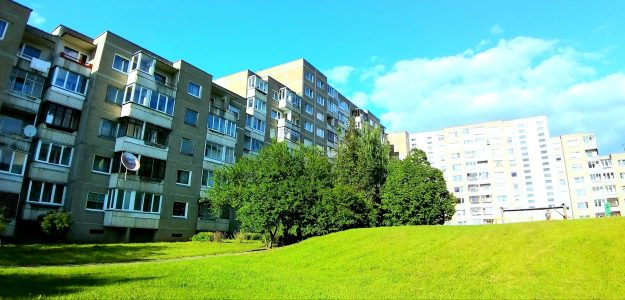The Bank of Lithuania calls for the introduction of a global RE tax, which should apply to all without exception
LRYTAS.LT BUSINESS MARKET PULSE
The bank of Lithuania's tightened initial contribution requirement for non-first home loans will cool the high-risk housing market segment and reduce the risk of over-indebtedness. In many cases, buyers who are leading the market for unpredictable expectations and agitation increase their indebtedness and buy additional housing in order to rent it out or resell it, even though they have not yet repaid a significant part of the first loan. However, in order to prevent the risk of overheating of the housing market as a whole, it is necessary to expand the arsenal of measures.
"Although there are still no significant imbalances in the country's real estate (RE) market, the annual growth rate of house prices of up to 20% signals that the market is heating up. The Bank of Lithuania has already taken measures to cool the segment of the high-risk housing market, but in order to avoid overheating, the attention of other institutions to the topic of the heating RE market is also needed," says Gediminas Šimkus, Chairman of the Board of the Bank of Lithuania. The Board of the Bank of Lithuania has approved amendments to the Responsible Lending Regulations regarding the application of the higher initial contribution requirement for non-first loans and plans to decide in the near future on the requirement of a systemic risk buffer of 2% for the housing loan portfolio of credit providers. According to the Bank of Lithuania, the total flow of all new loans could contract by up to 10 per cent due to the tightened initial contribution requirement and the planned reserve requirement for the home loan portfolio of lenders, while house price growth could be up to 3 percentage points lower.
A doubling of the minimum initial contribution requirement for subprime mortgages to 30% should affect around 40% of first-time borrowers, i.e. this proportion would have to pay a higher initial contribution. Mortgage interest would not be substantially affected by the measures, which could increase by just 0.05 percentage points due to the additional capital requirement. Currently, new home loans are granted on average at an interest rate of 2.12%. It has fallen by 0.25 percentage points since the beginning of last year.
According to G. Šimkus, the sustainability of the housing market would also be enhanced by unpredictable incentives to invest in real realm limited by a universal and socially oriented non-commercial real realm tax. The Bank of Lithuania has submitted proposals to the Ministry of Finance that the RE tax should be applied to the re-tax in its entirety without exception, establishing a bar for the minimum tax-free value of assets, so as not to harm the most disadvantaged residents. This tax should be progressive, i.e. the starting rate should be very low, for example, 0.1% and increase if high-value or luxury RE is managed.
For a few hundred thousand euros or a luxury millionth of REAL, much more significant amounts would have to be paid– it would already be hundreds or even thousands of euros. Such a tax would allow to significantly supplement municipal budgets, and the received funds would be allocated to the management of towns and cities, maintenance and development of their infrastructure.
Another measure is the compulsory registration of preliminary contracts for the sale of unfurnished dwellings. Such a legislative change would contribute to the transparency of the primary market, would allow the Bank of Lithuania and other institutions to monitor in real time the trends of transactions and prices of the primary housing market, the extent of speculative transactions, to more accurately identify the risk of overheating of the housing market and to take measures to reduce these risks. The current environment of increased expectations of reprication creates a medium for speculation on reservations, and the assessment and limitation of this phenomenon could reduce market tensions. The Bank of Lithuania has submitted proposals for mandatory registration of contracts to the Ministries of Justice and Environment and is awaiting their conclusions.
Galiausiai tvarią rinkos plėtrą skatintų mažinamas šešėlis NT sektoriuje, pavyzdžiui, įteisinus reikalavimą pradinį įnašą ar net visą būsto įsigijimo sandorį atlikti skaidriai pavedimu ir apriboti atsiskaitymą už NT grynaisiais pinigais.

